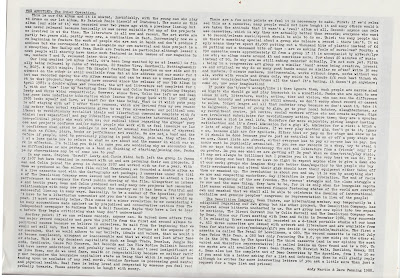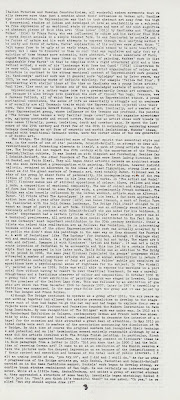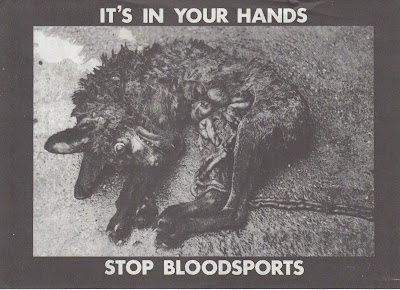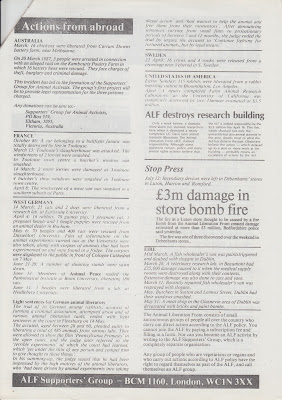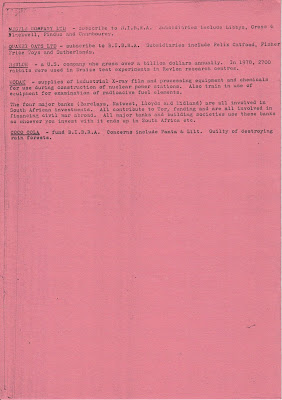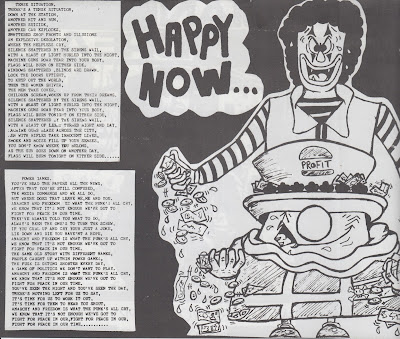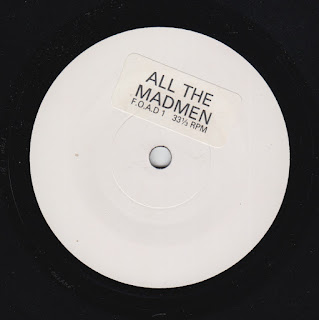This is a bit of an odd one.
DIY or die
The British DIY punk scene in 1988 usually conjures up images of foul-breathed crusty punx growling into unsuspecting microphones or jumping bandanaed hardcore kids who wished they were born in Boston instead of Burnley. Well, to me anyway. Little do people remember that The Apostles were still around at that time, thus being one of the last anarchopunk bands formed in the early 80's still active seven years later, a survivor status that is highly ironic - and perhaps irrelevant - considering that the band were highly critical of the anarcho scene (Andy Martin even coined the term "Flux of Punk Idiots" which, I must admit, I find very funny). As for Statement, it was a one-man anarcho project that can be justly seen as the originator of militant vegan straight-edge punk in Britain, if not in the world. If you are not familiar with this record, the idea of a "performance art group" - as The Apostles refer to themselves - teaming up with a vegan SxE solo project might sound a little baffling if seen through our pervasively judgmental 2017 lens. But then, for all their often misunderstood political and musical radicalism, The Apostles were also a self-proclaimed open-minded bunch and Rat, the creator behind Statement, was not only mate with them but also drummed on their first album, Punk obituary. And is it just me or are there hypnotic guitar leads on both sides of the Lp?
As usual with works from The Apostles, there is as much to read (if not more) as to listen to so I am not going to retrace the band's history since they provided lengthy texts that did. So let's get to Statement right away.
It is unclear when Statement exactly started, but sometime around '83 or '84 sounds like a fair guess. Prior and simultaneous to Statement, Rat played in Muted Existence (which I have never heard) and in Arrogance, whose '87 demo was reviewed five years ago (times flies...) on Terminal Sound Nuisance (here). The UK punk scene cannot be said to have been a great purveyor of one-man bands. Of course, there were solo projects, usually folk music or poetry reading (or the proverbial drunk geezer shouting at the stage), but apart from the great Man's Hate (Andy Xport's project that can only be defined as anarcho-Beat music), Statement may have been the only one. And without using a drum machine, which is an exploit in itself. Discogs tells me that Rat released nine (!) Statement tapes between 1984 and 1987 on his own Active Sound Records but I am only familiar with the first one, a 16-song effort of mostly sloppy but energetic punk-rock with plenty of different moods, from Zounds-inspired pop-punk, to fast hardcore numbers reminiscent of SAS or vintage Conflict-like anarcho music. It is a bit of a tedious demo if you listen to it in one row, but then it was also a youthful work and there were some good songwriting ideas, especially in the snake-like guitar leads that sometimes pop up in the songs and remind me of Fallout or indeed The Apostles.
In 1987, Statement released a split Ep with - you'll never guess - The Apostles with two brilliant songs, the super catchy and tuneful Bluurg-like punk-rock anthem "Who won the human race" and the epic metal-punk number "A box with no corners" that brought Anihilated or early Deviated Instinct to mind. With two songs as solid as these, you would have thought that the next record was going to confirm all the good things appearing on the Ep. But then, fate struck and while the first split sounded great, the next one was the victim of a horrendous mastering work that made the whole Statement side sound close to the harsh and rough hardcore of Medellin (the infamous punk Medallo of HPHC, Bastardos Sin Nombre or Ataque de Sonido), which was probably not Rat's intention. It sounds bad. I know I am being hyperbolic here and the Statement side is not a complete wall of proto-grind earslaughtering distortion but it is clearly noisy, distorted and pretty cheap-sounding although accidentally and unpurposely. And it is exactly why I love it. Of course, a part of me wishes for a decent sound production (and unsurprisingly Rat dismisses this record, I suppose I would still be pissed as well), but then I think these Statement songs have an unbeatable sloppy charm and end up being unique examples at the time of a blend between vintage UK anarchopunk, harsh noisy hardcore and metal punk, basically tunes, distortion and heaviness. Sometimes, great things happen by accident and I cannot think of anything even remotely similar to these Statement songs in the UK in 1988.
The side starts off with a dirgeful, noisy introduction before unleashing the first hit, a harsh Icons of Filth-type song with some crunchy metal riffs, hypnotic guitar leads (Rat was definitely very skilled in writing them), angry gruff vocals and an incredible conclusion that can best be described as poppy noisepunk. While you could argue that the horridly thin and saturated production completely spoils any attempt at tunefulness, I would tend to think that it offers something different, dissonant and ultimately interesting, like the meeting of subtle, soft anarcho-pop harmonies and distorted Bristol punk, as if Systematic Annex were jamming with Dirge or Disorder were covering A Touch of Hysteria. You've got all out fast hardcore numbers too, which work particularly well with the wall of distortion, as well as dark punk songs that bring Fallout or even Part 1 to mind with these cracking guitar melodies that remain stuck with you for days. Reminence (I know, I know) of a Destructive Age is a very diverse work since you will also find songs that would not have been out of place on a UK82 compilation and others that fit perfectly with the metal-punk sound that prevailed at the time (there's even a funky rap song!), and all these different vibes and genres are united by the ridiculous production and the entrancing, dark catchy leads that never fail to appear and mesmerize. I ultimately leave this Statement record to your personal appreciation, since the claim that the production makes it unlistenable and denatures the artist's intent. As for me, not being averse to rough sound and sloppiness, I think it is marvelous.
As you can expect, a lot of the songs revolve around animal liberation, veganism and being drug-free and since Rat puts his money where his mouth is (probably one of the weirdest expressions of the English language), there are also a lot of documentation about hunt-sabbing, the ALF and how to support animal rights through direct action. The record itself looks lovely and I really enjoy the anarcho-pagan artwork on Statement's inserts although I have reservations about the wyvern (it is a wyvern, right?) on the cover. Following the split Lp, Statement went on to become a tight metalcore project and got into the hardline movement of the early 90's. I often picture people into the whole hardline vegan SxE thing as wearing baseball caps, ample jerseys and sports shoes, so seeing the distinctively anarchopunk aesthetics of early Statement would probably be a huge shock for the younger generations of Earth Crisis fans, despite the obvious historical ties.
On the flipside are The Apostles, possibly the most prolific bands of the anarchopunk wave (which they were a part of and will always be remembered as being, although they might have been anti-anarchopunk and defined themselves as revolutionary socialists). To be honest, I do not agree with nor do I condone all of their political views which they stated very clearly through a text provided with the Lp that I encourage you to read. However, I definitely respect their very confrontational, polemical and sincere approach to punk and politics, which set them apart from the hippyish end of the spectrum. Even if you disagree with them, at least The Apostles make you think, react and question. As for the music... Well they certainly lose me when they go too experimental, dissonant, plain weird or avantgarde (there is six-page text about avantgarde rock provided with the Lp if you are interested). However, I love their tuneful punky songs, be they threatening class war anthems like on the Blow it up '82 Ep or '85's Smash the spectacle (who doesn't like a situationist reference in punk-rock?). The other operation, which was recorded two years before the split Lp actually came out, lies heavily on the experimental and dissonant side of things and I much prefer The Apostles when they were more direct and tense. If my rather basic tastes in music are not developed enough for me to really relate to some songs here, I really enjoy the classically catchy punk-rock number "A love that's died" and the more aggressive-sounding, pummeling "Absolution of guilt", the proper gem of the split for me, reminiscent of The Apostles' early years. Generally speaking, I am actually really into Andy Martin's voice, which sounds both determined and vulnerable (like any real revolutionary, they would probably point out). I even kinda liked the 11-long song that makes up half of their side, a quietly epic jazzy, psychedelic, free rock lyrical track with different movements and moods (yes, there is even a punk moment on "A world we never made"). Perhaps I am not that narrow-minded after all.
As usual with The Apostles the artwork is excellent, from the deliciously sarcastic comic on the cover (I absolutely love those, they are often a bit harsh but clearly truthful), to the vibrant drawings inside, it looks very neat indeed. Lyrically, the standout song is undeniably "A world we never made" (granted there are more than a few instrumentals on the album), which deals with alienation, depression and the inability to relate to a social world that we inherit but do not choose. It resonates perfectly with the artwork.
Inevitably, the band also wrote texts about their political stance about various issues, ranging from feminism, homosexuality, nationalism and - of course - the irrelevance of punk and ruffle a few feathers.
The Apostles' views
A "short" introduction to avantgarde rock
Hunt sabbing in 1987
ALF propaganda
Evil multinationals
A mere punk add!










